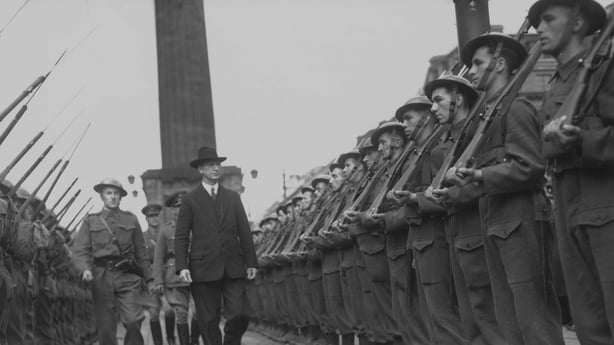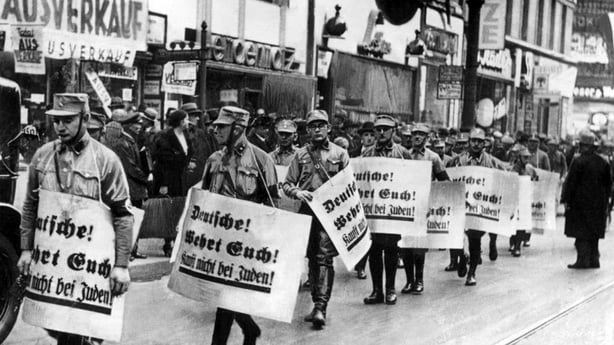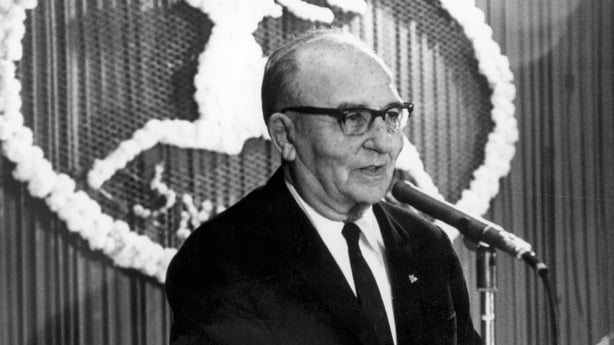Almost five decades after his death, the legacy of Éamon de Valera is in the news again.
As the Government wrestles with how to replace his reference to women's duties in the home in the Constitution, another of his controversial actions returned to haunt his successor as Fianna Fáil leader Michéal Martin.
On a visit to Israel, the Tánaiste faced some criticism in local media for Ireland's perceived anti-Israeli position and in that context was asked (by an Irish journalist) whether it had been a mistake for de Valera, as taoiseach, to offer condolences to the German nation on the death of Adolf Hitler.
This controversial act, one of the most controversial things de Valera ever did, has been regularly resurrected in the decades since, with some using it to suggest that he was pro-Nazi.
In fact, he was anything but and the story is a bit more complicated than some would have you believe, though you would be hard put to find anyone, then or since, who thought de Valera’s condolences were a good idea.
Context of course is key. Ireland was neutral in World War II (or, as it was termed here, 'the Emergency’), and although favourably disposed to the Allies and giving them considerable assistance behind the scenes, de Valera insisted on strict adherence to the formalities of neutrality.
So, while Allied airmen who crash-landed in Ireland were allowed to escape across the Border to Northern Ireland, while Germans were interned for the duration, this wasn’t admitted in public.

De Valera did criticise the German invasion of Belgium and the Netherlands in May 1940, at a time when such public criticism could have been dangerous, but in general, he kept his views to himself.
As the war drew to a close, though, he became increasingly irritated by the US Minister (a diplomat one rank below an ambassador) in Dublin, David Gray. Gray detested de Valera, and the feeling was entirely mutual.
He kept pushing for more overt Irish assistance, and in April 1945, with Allied victory clearly only days away, he demanded that the German Legation in Dublin be handed over to him.
De Valera was furious, rightly seeing that this would breach Irish neutrality and sent Gray away with a flea in his ear.
However, he was determined that he would demonstrate to the world that he would apply neutrality to the letter.
Which is what led to his greatest error of the entire war.
When news came through on 2 May 1945 that Hitler was dead, de Valera called on the German Minister, Eduard Hempel, ‘to offer condolences’ on his death.
Despite the popular legend, he did not sign a book of condolences, no such book existed.
But the visit was prominently reported in the newspapers, at a time when they were also reporting on the liberation of concentration camps across Nazi-occupied Europe.
What was he thinking? Officials in the Department of External Affairs later claimed that they had begged him not to do it, but as far as de Valera was concerned, he was doing what neutrality demanded.
After all, he had called on Gray to offer condolences when President Roosevelt died three weeks before, to do less on this occasion would be an insult to Hempel personally, and a rejection of the diplomatic doctrine that relations are between states, not governments.
He made a mental distinction between the personality of Hitler and the German people as a whole.
He was also, according to the British Representative in Dublin, Sir John Maffey, prompted by his feud with Gray, deciding "to get a mention for a conspicuous act of neutrality in the field. He would at least show that he was no ‘bandwagoner.’"
He had certainly achieved that; unlike some nations which declared war on Germany in the days before her final defeat, de Valera had stuck to neutrality.
But the reaction in Britain and, particularly, the United States was one of fury.

Realising the damage, External Affairs checked to see how other neutral states had marked Hitler’s death.
The Swiss took no action, as they hadn’t been officially informed of the death; the Spanish Foreign Minister paid a condolence visit to the German Embassy but kept it out of the newspapers; Portugal flew flags at half-mast but got away with it because they had allowed the Allies use bases in the Azores. De Valera was on his own.
His postbag from America told the story. "It’s a pity the British did not shoot you…" wrote one Irish American.
Another said the condolence visit was "an insult to the Irish and more especially those of the Catholic Faith…".
Yet another pithily suggested that "the Irish people should tar and feather you, you dirty bum…".
De Valera, characteristically, claimed not to care and went to considerable lengths to justify his actions (usually a sign that he realised he’d made a mistake).
"I acted very deliberately in this matter. So long as we retained our diplomatic relations with Germany to have failed to call upon the German representative would have been an act of unpardonable discourtesy to the German nation and to Dr Hempel himself ... I acted correctly and I feel certain wisely," he wrote to Robert Brennan, Irish Minister in Washington.

Not for the only time, de Valera was on his own; while his actions may have been correct under a strict definition of neutrality, they were most certainly extremely unwise, and have echoed down the decades.
The condolences were still being mentioned by British officials in the 1980s and, as we have seen, occasionally surface in the Israeli media, with the implication that de Valera (and, by extension, Ireland) was pro-Nazi or antisemitic.
In that context, and returning to the Constitution, it is worth noting that in 1937, de Valera included a specific recognition of the Jewish faith in the article on religion, an extremely striking decision at a time when antisemitism was rampant in Europe.
In recognition of that act, in the 1960s the Éamon de Valera Forest was planted in Israel, near Nazareth.
The then-Israeli prime minister, Levi Eshkol, said the forest was a "fitting expression of the traditional friendship between the Irish and Jewish peoples, two nations that have so much in common of history and fulfilment."







